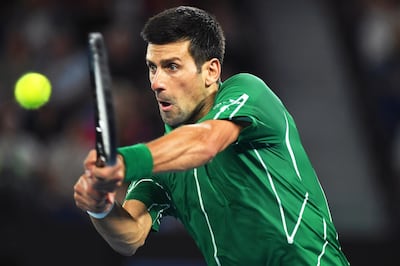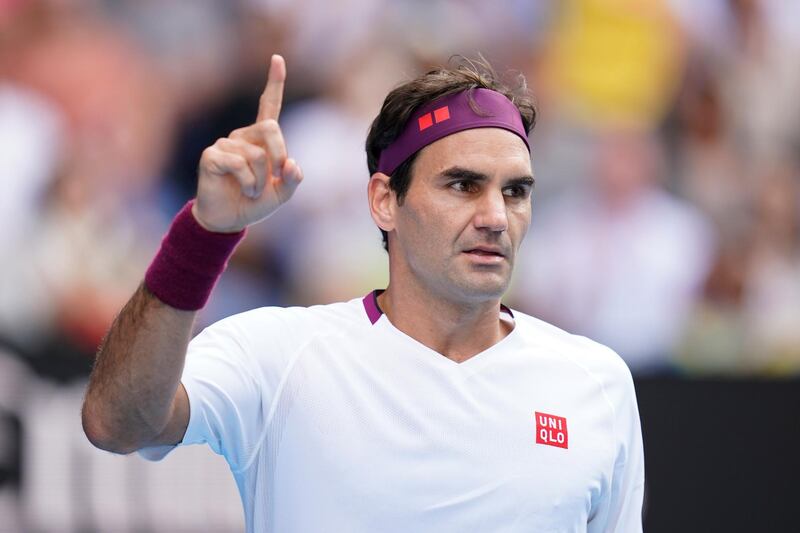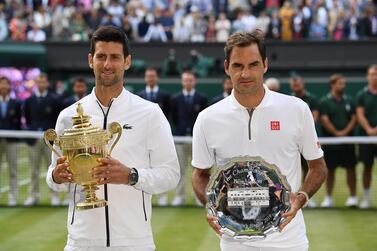Nearly 14 years have passed since Roger Federer and Novak Djokovic first traded blows on a tennis court. It was April 17, 2006 at the Monte Carlo Masters. A 24-year-old Federer had already been sitting pretty at the top of the world rankings for more than two years and had won the first seven of his record 20 Grand Slam titles.
Djokovic, by comparison, was an 18-year-old whippersnapper, ranked No 67 and still six months away from his first title of any kind. Unsurprisingly, it was Federer who won that meeting, although it did go the full three sets. Federer would beat Djokovic another three times without reply until the Serbian got one on the board in the 2007 Canadian Masters final.
What would subsequently unfold was one of the most competitive rivalries in tennis history, at least for a while. Between the 2007 US Open – their next meeting – and 2012 Wimbledon – Federer’s most recent major win over Djokovic – the pair met 22 times, winning 11 matches each.
Since then, though, it has all been rather one-sided, with Djokovic victorious on 15 of 23 occasions, including all five Grand Slam contests. Even in the one Grand Slam match Federer largely dominated, the 2019 Wimbledon final, Djokovic still found a way to win.
Next up is the half century – a key milestone in many sports. It is testament to the enduring brilliance and fitness of both players that they meet for a 50th time, particularly in the latter stages of a major.
Yet, such is Djokovic’s recent dominance – both of Thursday’s opponent and the Australian Open – that this semi-final meeting should be a mere formality for the defending and record seven-time champion.
Take into account form, with Djokovic on an 11-match winning run and Federer battling back from the brink in previous rounds against two unheralded opponents, and all signs seem to point toward an eighth Australian Open final for the 32-year-old Serb.
“It helps when you start the year off with a bang,” Federer said, referring to 16-time Grand Slam champion Djokovic’s streak that included leading Serbia to the inaugural ATP Cup.
Federer, 38, has produced what he called “miracles” at the tournament so far, after saving seven match points against Tennys Sandgren in the quarter-finals, having previously clawed back from 8-4 down in the decisive tiebreak to beat John Millman 10-8 in the third round.
"What he did [against Sandgren] was amazing. He showed he is one of the best players of all time,” Djokovic said. “He never gives up. When it matters the most, he is focused and he plays his best tennis. He is a great fighter. Obviously, I have lots of respect for him."
However, world No 100 Sandgren is one thing, Djokovic quite another.
Then there is the injury that almost spelled the end for Federer in the last round, a groin problem requiring a medical timeout. The Swiss was able to shorten points and rely on serve and superior composure to get past the American – luxuries he will not be afforded on Thursday against the greatest returner and baseliner the game has ever seen and a player at least equal in mental toughness.

"I feel pretty good right now. I don't know if you can call it an injury. It's just pain and problems," Federer, a six-time winner in Melbourne, said on his fitness. "Good nights of sleep, doctors, physios. Hopefully we'll find out that it's actually nothing bad."
One advantage Federer will be able to call on is the overwhelming support of the crowd. Despite being the Australian Open’s greatest male player, Djokovic is not afforded the same levels of adulation as Federer at Melbourne Park – or indeed, anywhere.
The Centre Court crowd almost willed him over the line at Wimbledon last year and the majority inside Rod Laver Arena will be hoping to provide a similar boost.
Federer, of course, remains a remarkably skilled tennis player capable of beating anyone, including Djokovic, on his day. "Roger is Roger," Djokovic simply said of the threat posed by the third seed. "You know he's always going to play on such a high level."
Whether that level is going to be high enough to dethrone the Australian Open's most powerful king will soon be discovered.






